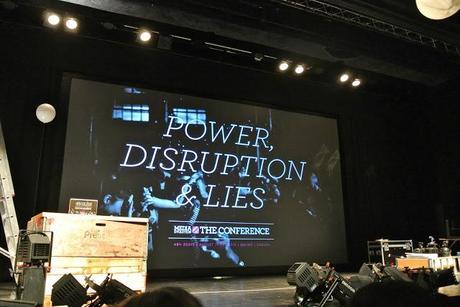 Then again, I do. The conference kicked off with an opening keynote by Dr. Suzannah Lipscom, a historian, who said things like "it's the power to do good, the dance of the production of change, of the unpredictability of the future which makes us all liars" when taking apart the theme of this year's conference and then left us with historical examples of how, "we can use informal power to change behavior." My nerdy aspirations ran wild as experience paired inspiring presentations alongside insightful yet informal chats on innovation in contemporary media with a British feminist, American researcher, Dutch web programmer, Swedish artist, etc.
Then again, I do. The conference kicked off with an opening keynote by Dr. Suzannah Lipscom, a historian, who said things like "it's the power to do good, the dance of the production of change, of the unpredictability of the future which makes us all liars" when taking apart the theme of this year's conference and then left us with historical examples of how, "we can use informal power to change behavior." My nerdy aspirations ran wild as experience paired inspiring presentations alongside insightful yet informal chats on innovation in contemporary media with a British feminist, American researcher, Dutch web programmer, Swedish artist, etc.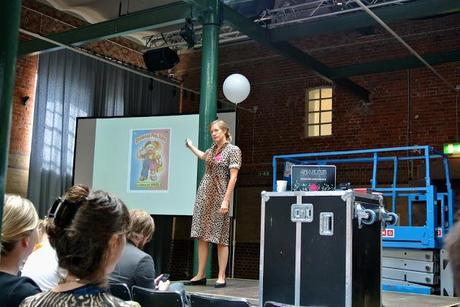 Before lunch on that first day, I listened to practical advice from Matthew and Fabian such as, "hypothesize your acquistion channel - where do they 'hang out' online?" This tip and many more regarding "lean marketing" have been integrated into my work at PageYourself. " I also received some clarification into how I'd like to contribute to Change Making after hearing Lina and Marcin talk. I was especially blown away by Lina's Equalists Project, a campaign for equal representation for women and other minority groups across industries that has been built almost entirely on humble Facebook pages. It's rapidly expanding and I'm eager to get involved.
Before lunch on that first day, I listened to practical advice from Matthew and Fabian such as, "hypothesize your acquistion channel - where do they 'hang out' online?" This tip and many more regarding "lean marketing" have been integrated into my work at PageYourself. " I also received some clarification into how I'd like to contribute to Change Making after hearing Lina and Marcin talk. I was especially blown away by Lina's Equalists Project, a campaign for equal representation for women and other minority groups across industries that has been built almost entirely on humble Facebook pages. It's rapidly expanding and I'm eager to get involved.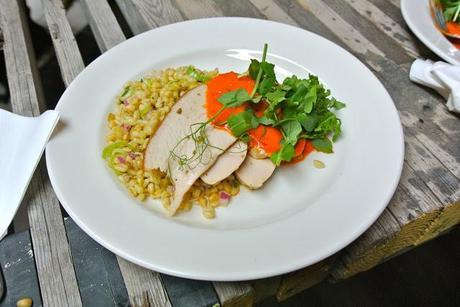 Afterwards, on the menu for our mid-day meal: lemon-baked turkey breast marinated with capers and parsley alongside a wheatberry salad with roasted paprika vinaigrette. I enjoyed a sparkling water and plenty of great conversation as well.
Afterwards, on the menu for our mid-day meal: lemon-baked turkey breast marinated with capers and parsley alongside a wheatberry salad with roasted paprika vinaigrette. I enjoyed a sparkling water and plenty of great conversation as well.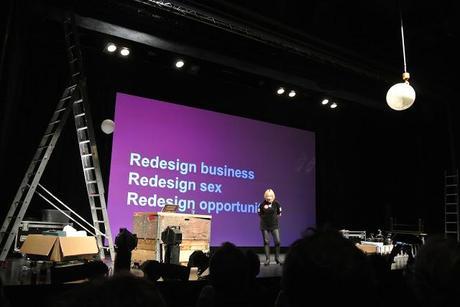 Then we jumped right back into creative and critical thinking with Cindy Gallop. I cannot even express to you how incredibly provocative her keynote was. Please just watch it. Originally a global advertising consultant, she is now focusing on a project to tap into, "the single most untapped pool of resource: personal good intentions," and another to disrupt the porn business. Yes, really. She's doing so in the most amazing way, proving that we can, "integrate social responsibility into the way we do business."
Then we jumped right back into creative and critical thinking with Cindy Gallop. I cannot even express to you how incredibly provocative her keynote was. Please just watch it. Originally a global advertising consultant, she is now focusing on a project to tap into, "the single most untapped pool of resource: personal good intentions," and another to disrupt the porn business. Yes, really. She's doing so in the most amazing way, proving that we can, "integrate social responsibility into the way we do business."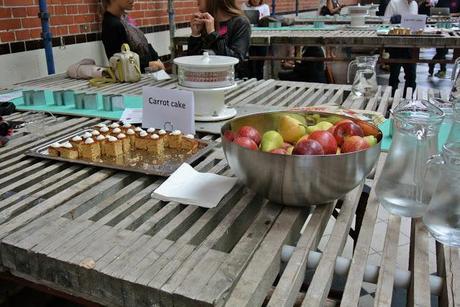 I went on to contemplate online harassment as I heard the heartbreaking personal accounts of Laurie and Anita with Kate's academic insight. Though emotional, I felt hopeful in the presence of their grace and bravery. And later, as Ruth presented Un-Convention and Foro Di Eixo, I realized how effective passion can be in mobilizing individuals into forces of collective good. Ariel, a designer turned space enthusiast, reaffirmed it as she shared the story of her movement for citizen space exploration.
I went on to contemplate online harassment as I heard the heartbreaking personal accounts of Laurie and Anita with Kate's academic insight. Though emotional, I felt hopeful in the presence of their grace and bravery. And later, as Ruth presented Un-Convention and Foro Di Eixo, I realized how effective passion can be in mobilizing individuals into forces of collective good. Ariel, a designer turned space enthusiast, reaffirmed it as she shared the story of her movement for citizen space exploration.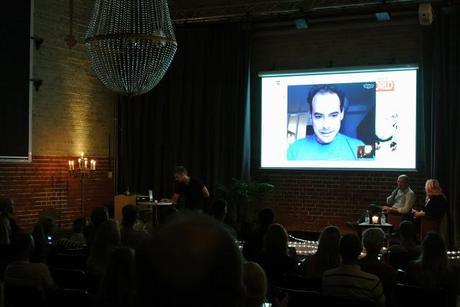 With all potential floating in my head, I took advantage of the free glass of happy hour wine, mingled a bit, and then retreated to the Doc Lounge for The Yes Men screening. Little did I know I'd actually have the chance to ask Mike Bonanno a question I'd rhetorically asked in my Global Advocacy class. His answer to how they measure their success: "our mission is not for The Yes Men to be better liked, but for the issue to get as much attention as possible. The point is to give voice to activists and victims." I was almost too satisfied with his response, to enjoy the director of Searching for Sugar Man's keynote. A good night's sleep was so necessary.
With all potential floating in my head, I took advantage of the free glass of happy hour wine, mingled a bit, and then retreated to the Doc Lounge for The Yes Men screening. Little did I know I'd actually have the chance to ask Mike Bonanno a question I'd rhetorically asked in my Global Advocacy class. His answer to how they measure their success: "our mission is not for The Yes Men to be better liked, but for the issue to get as much attention as possible. The point is to give voice to activists and victims." I was almost too satisfied with his response, to enjoy the director of Searching for Sugar Man's keynote. A good night's sleep was so necessary.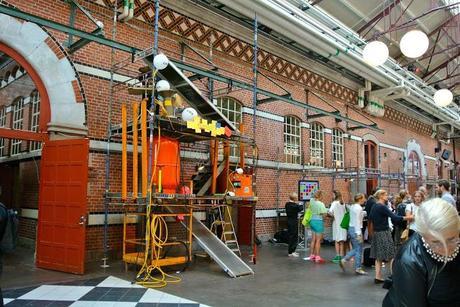 Thankfully, I got one. So much so that I had to rush out of Liselott's apartment, through Malmö, and to the contemporary Slaghuset the next morning. I made it to James' keynote just on time. As a seasoned critic of technological dependence, I was struck by his claim that "technology is not a mutual good, it's a tool." It really is up to us. My awe was then followed by this thought: gosh, I wish I had a robotic clone to annotate Emily's beyond crowd-funding anecdotes while I learned how visual media affects culture and identity.
Thankfully, I got one. So much so that I had to rush out of Liselott's apartment, through Malmö, and to the contemporary Slaghuset the next morning. I made it to James' keynote just on time. As a seasoned critic of technological dependence, I was struck by his claim that "technology is not a mutual good, it's a tool." It really is up to us. My awe was then followed by this thought: gosh, I wish I had a robotic clone to annotate Emily's beyond crowd-funding anecdotes while I learned how visual media affects culture and identity.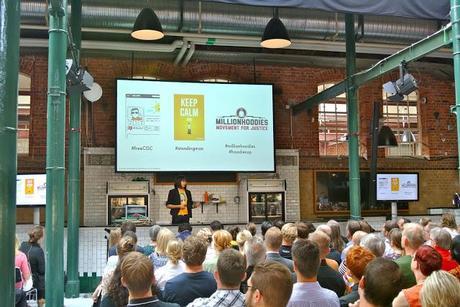 Alas, I did not, so I just soaked up the research inspiration as An proved how, "remix culture is a way to take control of the narrative," Tricia advocated for trust as we "preserve spaces for informal modes of interaction," that allow our elastic selves to flourish, and Kenyatta told the timeless story of the .gif--in an especially hysterical way. I'll admit I followed the other presentations with #theconf.
Alas, I did not, so I just soaked up the research inspiration as An proved how, "remix culture is a way to take control of the narrative," Tricia advocated for trust as we "preserve spaces for informal modes of interaction," that allow our elastic selves to flourish, and Kenyatta told the timeless story of the .gif--in an especially hysterical way. I'll admit I followed the other presentations with #theconf.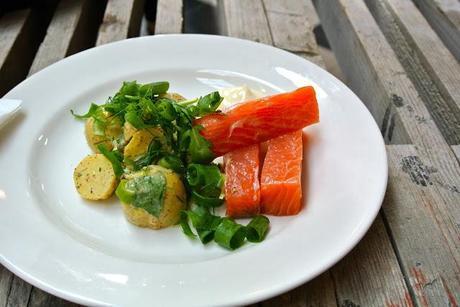 For some larger picture perspective, I went to the presentation on thinking about "Now in the Past." It was wonderful to hear from Matt, someone who has clearly found his professional calling in his belief that, "the history of the future is borne of optimism." The concept aligned closer with Åsa's approach to urban planning than expected. "What defines cities is the people who live in that city." With all those ideas, I pondered my master's thesis as I ate lunch that day: salmon with sour cream and roasted dill-potatoes.
For some larger picture perspective, I went to the presentation on thinking about "Now in the Past." It was wonderful to hear from Matt, someone who has clearly found his professional calling in his belief that, "the history of the future is borne of optimism." The concept aligned closer with Åsa's approach to urban planning than expected. "What defines cities is the people who live in that city." With all those ideas, I pondered my master's thesis as I ate lunch that day: salmon with sour cream and roasted dill-potatoes.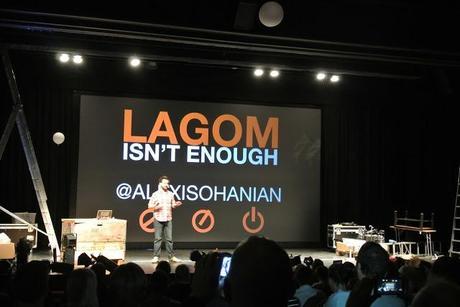 And before I knew it, the conference part of The Conference was over. (There were a few more presentations but I was too overstimulated to really walk away with extra impact). I cannot imagine having had anyone but Alexis, co-founder of Reddit, give the closing keynote on "the importance of giving a damn about the people who are about to use and consume what you create." He's right. Lagom, a Swedish word roughly translating to a Goldilocks-esque "just enough", isn't enough when it comes to these challenges to society. And with that, I ended this night at the Malmö Festival, spent most of Friday on that Sustainable Tourism excursion, ate a Saturday lunch in Copenhagen, and realized what I want to spend these next few months researching.
And before I knew it, the conference part of The Conference was over. (There were a few more presentations but I was too overstimulated to really walk away with extra impact). I cannot imagine having had anyone but Alexis, co-founder of Reddit, give the closing keynote on "the importance of giving a damn about the people who are about to use and consume what you create." He's right. Lagom, a Swedish word roughly translating to a Goldilocks-esque "just enough", isn't enough when it comes to these challenges to society. And with that, I ended this night at the Malmö Festival, spent most of Friday on that Sustainable Tourism excursion, ate a Saturday lunch in Copenhagen, and realized what I want to spend these next few months researching.

